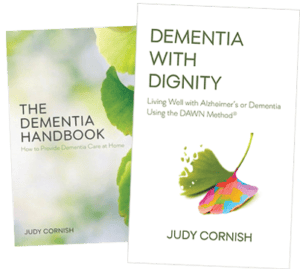There are more people searching for information on the dementia ‘anger stage’—and how to deal with dementia patients who are angry—than for any other answers about dementia care. This should tell us something. (This article is Part 2 of our series on anger; see Part 1: Mean Dementia—Dementia and Being Mean to Family; see Part 3: Dementia and Aggressiveness)
Is there a dementia anger stage?
Is there an ‘anger stage’ of dementia? Not really. A person with dementia will progress through the stages of dementia but the changes have to do with level of functioning, not with anger.
“Why is my elderly mother never happy?!”
We make them angry without realizing it
Either dementia makes people so crazy that they feel angry and upset for no reason at all, or there is something causing people to feel angry and combative when they are experiencing dementia. During the past decade I spent a lot of time with people who’re experiencing dementia, and I soon realized that the second statement is true, not the first. They were not crazy. I was the problem—I was making them angry without realizing it. I had to understand what I was doing wrong and change it if I wanted them to stop being angry and mean to me.
The rules in relationships change with dementia
If you’re spending time with someone who’s experiencing dementia, you can avoid the dementia anger stage (and you can avoid combative and angry dementia behaviors), but only if you become more aware of what’s causing it. When dementia comes into a relationship, the rules change. A relationship including dementia is different from any you’ve experienced before. You will need to understand the cognitive skills we all normally use—and then which ones we continue using when we’re experiencing dementia.
In my first article in this series (Mean Dementia—Dementia and Being Mean to Family), I described our two thinking systems and explained the most frustrating rational thinking losses caused by dementia. I also described our intuitive thinking skills—those that we continue using. It will be helpful to read that article first if you haven’t yet.
Losing rational thinking skills means losing the ability to manage moods
Once we understand the skills lost and kept in dementia, we need to think about how those changes affect our feelings and moods. You may not have considered this before, but if you have both memory skills and rational thinking skills, you are fully equipped to escape any emotion that circumstance might bring your way.
Imagine, for example, that you and a friend have been playing phone tag for quite some time and you are finally on the phone talking, yet she seems preoccupied and uninterested in what you’re saying. If you’re like me, you might feel a blend of irritation and hurt. I would feel irritation because we finally have a chance to catch up yet she doesn’t seem interested in talking, and hurt because she’s someone I expect to care about my feelings and to want to listen to me. Now what do I do?
Now, because I don’t have dementia, I have the skills needed to change my feelings before they settle into a negative mood. I have both rational thinking skills and memory skills at my disposal. I can use memory skills to remind myself that we haven’t talked in quite a while so I don’t know what’s been going on in her life. I can use rational thinking skills to consider whether she might be dealing with something far more concerning than I am. I can use both memory and rational thinking skills to put my story on hold and ask her about herself. I don’t have to feel irritated or hurt because I can think about why she might be acting the way she is.
It’s not a dementia anger stage, it’s a natural stress response to something that is upsetting
However, if I were experiencing dementia, I couldn’t do any of that because I would have lost the necessary skills. If my friend sounds distant and uninterested, I will take it personally. If my husband looks irritated when I slam down the phone and say something mean about her to him, my anger will increase and become grumpiness that persists. I might again be mean to my husband immediately or I might be surly or even aggressive with the next person I meet.

Losing the ability to understand “why” someone is frowning
When we are experiencing dementia, we don’t suddenly arrive in a ‘dementia anger stage.’ We simply get hurt and angry often because we can’t use memory or reasoning to consider the reasons for why someone might do something or say something to us. When we can no longer understand why, we take everything personally. We can’t help it. So if our companions don’t understand what we cannot do—and understand how to help us—we all end up dealing with a lot of meanness and anger.

The first reason for why people who’re experiencing dementia often get angry and mean is that they have lost the ability to consider why other people say or do what they do.
The second reason is because they have become unable to change their own moods.
Think again about the cognitive skills we all have and use daily: we have memory skills that allow us to search for and retrieve memories. We have rational thinking skills that allow us to see cause and effect, follow a sequence, and prioritize actions and ideas—essentially, the skills that let us perceive relationships between facts, such as what, where, how, when and especially why.

We can manage our moods—They cannot manage theirs
When we are not experiencing dementia and find ourselves upset by an experience or situation, we can evaluate, compare, and consider. We can choose to avoid being in a bad mood and we can choose to not inflict it on our companions. For example, if I’m late for an appointment and the car ahead of me is driving slower than the speed limit, I might feel irritated and frustrated but I have the skills necessary to change that feeling before it affects my mood. I can tell myself that I’m late due to my own lack of planning, that other people can’t be expected to hurry to accommodate me, and that it’s too nice a day to be in a bad mood. I can do that with my memory skills and my rational thinking skills and change the negativity I’m beginning to feel back into a positive mood. But when we’re experiencing dementia, we can’t do any of that.
So, with dementia in the picture, people can’t help taking everything personally, and they lack the skills to change the moods that result when they feel hurt or betrayed or taken advantage of. But there’s more to think about. It gets both worse—and better. There’s a third truth which is the key to avoiding combative and aggressive behaviors with dementia. When we are experiencing dementia, we cannot choose our own moods.
Mood transference—Our mood becomes their mood
Think about this: If someone experiencing dementia cannot change their own moods, what happens when a caregiver arrives looking worried or concerned, or someone walks into the room in a bad mood? What happens is mood transference, because we need memory and rational thinking skills to protect ourselves from other people’s moods—and without those skills we can only absorb their moods and feel bad too.
You are in charge of mood
So, if you are spending time with someone who’s experiencing dementia, this is the most important principle to understand: You are in charge of mood. You can bring it and you can change it for both of you. This is the only relationship you’ll ever have in which you actually are in control of mood for both of you.
These principles about mood management are among the first that I teach to families and caregivers in my classes, because if we can inadvertently cause someone who’s experiencing dementia to feel angry and hurt, we can also consciously cause them to feel happy and safe—once we understand how what they can and cannot do affects their moods. I created the DAWN Method® to do exactly this: to teach caregivers and families how to bring a sense of peace and safety to the people who need it the most—those who are losing skills to dementia.
How to prevent dementia and anger—It’s all about body language
And finally, because of all this, we need to become very aware of our nonverbal communications. In my article on mean dementia I explained that reading nonverbal communication is one of our intuitive thinking skills, and so it is something not lost to dementia. We begin learning to read our companions’ expressions, body language, and intonation at an incredibly young age—within hours of birth. And we keep those skills in dementia.
Dementia will take away our ability to understand language and eventually the meaning of even the first words we learned as toddlers, but people who are experiencing dementia remain very aware of their companions’ expressions, body language, and intonation. And without memory skills to distract them with memories of the past, or rational thinking skills to distract them with plans or anticipation of the future, people who are experiencing dementia are entirely present—fully alive in the moment and to what’s happening around them.

Facial expressions—Try not to frown
They will see and respond to the briefest flash of irritation on our faces. They can sense that we are concerned or worried from the set of our shoulders or slight tension in our stride as we enter the room. They can tell if we are frustrated from the slightest of pauses before we answer them or the merest intonation in a word. They are always reading our emotions.
And so, we must become aware of what we are communicating nonverbally. All of us have a default facial expression—the one we wear when we’re deep in thought or concentrating on a task or determined to solve a problem. For most of us that’s a frown. But if our companions are experiencing dementia, they won’t be able to remind themselves that we’re deep in thought, or concentrating—they will simply see the frown and take it personally.
If you spend time with someone who’s experiencing dementia, ask your friends and family to tell you when they see you frowning. It takes awareness and practice, but you can teach yourself to look happy and at peace when your mind is wandering or occupied elsewhere. Learning just this—to simply put a true smile on your face the moment you enter your loved one’s presence—will go far in changing the “dementia anger stage” back to peaceful, friendly interactions.

Body language—Stop and face them
Next, we have to think about posture. When someone lacks memory skills, it changes how they interpret gesture and posture. Suppose I’m making sandwiches for lunch and my husband walks into the kitchen and asks what I’m doing. If he isn’t experiencing dementia, I don’t need to stop and turn around to face him. I can simply direct a brief answer over my shoulder, because if he’s not experiencing dementia our previous conversations and exchanges will be there in his mind to temper my lack of attention during this moment.
However, if he’s experiencing dementia, he will by default interpret my posture as dismissive, because for him it’s (always) our first interaction and for him my posture will speak louder than my words. So, if my husband is experiencing dementia I need to pause and turn to look at him—and make eye contact—to avoid inadvertently hurting his feelings.

Your Superpower—Positive eye contact
Eye contact. This is a critical nonverbal communication tool with dementia. Eye contact is your superpower if you spend time with people who’re experiencing dementia. You can use it to send instant messages of love, acceptance, gladness, and gratitude—even when your hands are full and you’re at a loss as to what to do next. You can use it to prevent your loved one from sinking into the anger, hurt feelings, and misunderstandings that result in combative or aggressive behaviors.
And the opposite is true, too. If you don’t understand that eye contact is more necessary than usual with dementia, you are inadvertently communicating disinterest and lack of caring. People who’re experiencing dementia are living in the three-second “now”—a place that lacks any previous messages of love, acceptance, and appreciation.
So, when you find yourself wondering how your loved one became so mean, angry, and unhappy, remember these tools that you have at your disposal and they do not. Remember that we—their companions—are able to manage their moods while they are not. And that we can change what we are inadvertently communicating into messages of love and acceptance.
In the third article in this series, “Dementia and Aggressiveness,” I’ll address another key reason for why people who’re experiencing dementia can become mean, angry, and aggressive: they are feeling taken advantage of and powerless. Helping someone retain a sense of control will change combativeness and refusal into peace and compliance.
Is there a better way to navigate dementia?
The odds are against you if you rely on your gut. Working with people who are experiencing dementia requires a new way of interacting. Family members and caregivers (even incredibly empathetic ones) who don’t truly understand this will inadvertently embarrass, frustrate or undermine their loved ones and clients. Learn why that is and how to navigate dementia more successfully in our DAWN Method courses and books.
Are you a family member?
Are you a professional caregiver or organization?
§
Sign up for our newsletter and free video series
Sign up for our newsletter and get more advice on how to help someone experiencing dementia. As a bonus, you’ll get our free video series, “Preparing for Dementia.”
FAQs about dementia and anger
Not necessarily. Dementia may result in anger because people who’re experiencing dementia have lost the ability to consider why other people say or do things and so, take things personally. If a person with dementia feels safe, listened to and respected in your care, anger is much less likely. The DAWN Method is a set of tools that help families and caregivers support their loved one with dementia in a kind way and capitalize on the skills that they will keep.
Dementia patients often get angry because of how we interact with them. We can easily upset them without even knowing that we’ve done it. A person with dementia is very adept at reading body language, but at the same time, they have lost the ability to understand “why” someone may have said or done something. If you look irritated, they will take it personally. If you look distracted, they will assume that you don’t care about them. On top of that, a person with dementia has lost the ability to control their mood (or self-soothe). Because of this, once they are angry, they will have a hard time letting that bad feeling go. The DAWN Method teaches us how to interact in a way that decreases anger and stress for both the dementia patient and the caregiver.
Not really. A person with dementia will progress through the stages of dementia but the changes have to do with level of functioning, not with anger. That being said, we can cause a person with dementia to be angry without realizing it. Using mood management (a tool of the DAWN Method of dementia care) we can minimize anger and help a person with dementia feel happier and more secure in our care.



